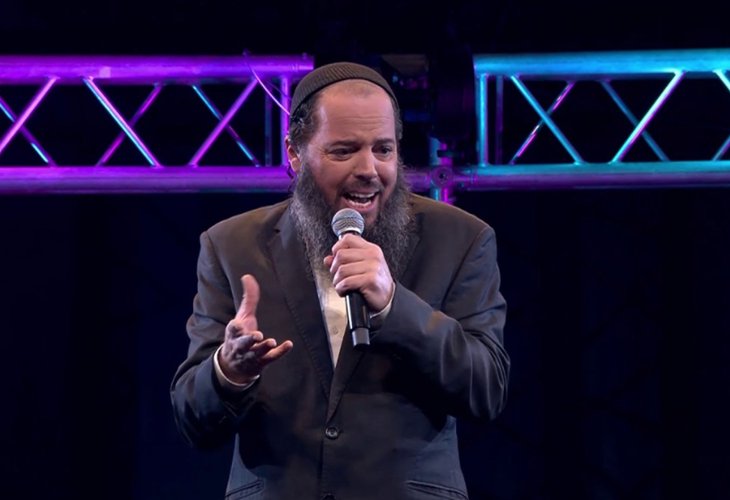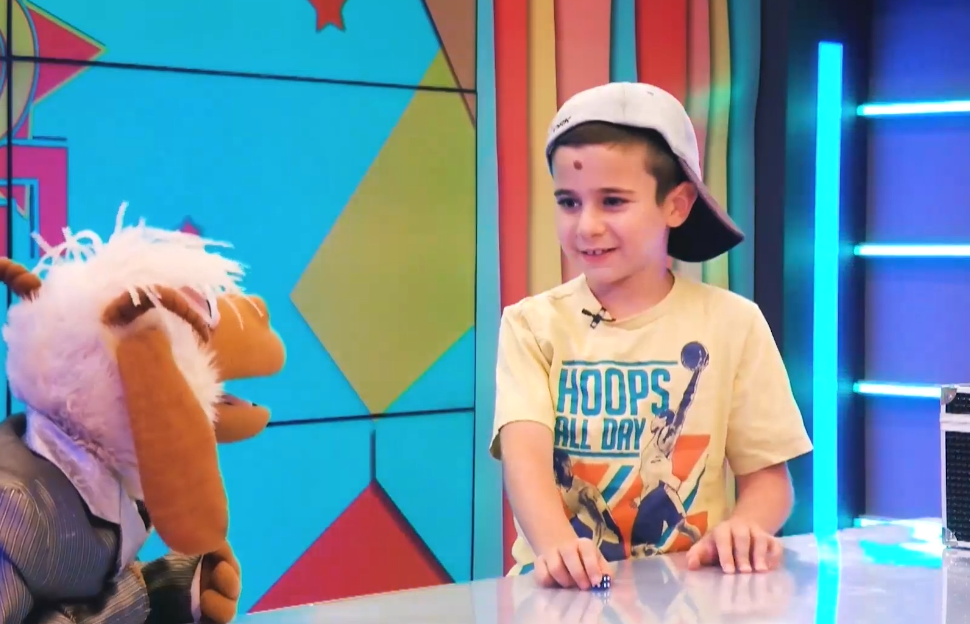"What the Parents Couldn't Do at Home and the Rabbis Couldn't Do in Yeshivas, You Achieved Through Your Programs on the Hidabroot Channel"
Raviv Zac is a screenwriter and actor who became a baal teshuva and is credited with many of Hidabroot's children's contents. In this interview, he discusses the challenges of his work and the dreams he has yet to fulfill.

"In the massive funeral procession held for Rabbi Kanievsky, of blessed memory," relates screenwriter and actor Raviv Zac, "I walked among the crowds and thought about the amazing influence that beloved Rabbi Chaim had. Suddenly, a young scholar approached me and said, 'Listen, I grew up with you and was greatly strengthened thanks to you. What the parents at home and the rabbis in yeshivas couldn't accomplish, like understanding the importance of not speaking lashon hara, you succeeded in doing through your programs on the Hidabroot channel.' In this case, and in many others in the past, I realized just how important what we do is. To this day, I have written quite a bit of content for the children's programs on the Hidabroot channel, and I see a lot of blessing in my work."
What do you think sets apart the content you produce for children?
"I can say that at Hidabroot, they realized many years ago that it is essential to produce quality content for children. Instead of children watching inappropriate things on other channels, it's essential to provide them an alternative. Even in content that might seem okay at first glance, there are often negative subconscious influences, and at Hidabroot we strive for zero mistakes."
"For instance, a while ago, I played Tzur's father, and after we finished filming the scene, I asked to film it again. I felt I was too harsh with him, and I didn't want to show that it's acceptable for a father to speak to his son that way. Sometimes during productions, an actor would ad-lib and say some street slang, and we would stop and re-film. Some say, 'It's just one word,' but we believe that it eventually sinks into the children."
"These are really subtleties, but we are very meticulous about everything that is released. We constantly strive to create smart content, supervised content that provides value, and think about how through content we can influence children to be better people and very connected to Torah and mitzvot. We have a significant responsibility at the Hidabroot channel because we are a substantial alternative for those who choose not to watch other content due to the lack of modesty and other negative elements."
"I think Hashem gave me the talent for writing and acting so I could do it in holiness after I was fortunate to return to Judaism at age 33. Before that, I tried to work in this field in the secular world but it didn't succeed as much, and in the religious world the doors suddenly opened for me. Thanks to that I understood that this is my mission, and I see it in practice. For instance, no matter how much Torah I study, I find it challenging to deliver a Torah lesson in the synagogue, but I feel that relatively easily I can convey good and important messages through a Torah-based children's series."
Shocked by Bava Metzia
As testified by himself, Zac (47), married and father of seven living in Netanya, wasn't always in the world of Torah and mitzvot. "I was born into a secular Tel Aviv family, studied in secular schools, and at home we had a very basic tradition. After the army discharge, I did various adrenaline-pumping activities – motorcycles, paragliding, etc., and constantly asked myself what the next thing was. These things satisfied me at the moment, but very quickly, that feeling vanished. I got married at 25, we had two daughters, and only at 33 did we return to Judaism after realizing there had to be something much greater than what I was seeing."
"From a relatively young age, I had a small interest in Judaism and often watched the Hidabroot channel. Shortly before becoming religious, I entered the Adadi Yeshiva in Netanya and heard a lesson on a topic in the Tractate Bava Metzia. I was amazed to see how much depth could be encapsulated in a few lines, and then I realized there was something tremendous here. Moreover, a few years prior, my wife's family became ultra-Orthodox, and that also influenced us. It was a very powerful story – my wife traveled to the U.S. for a couple of years in her youth, and when she returned, they were already ultra-Orthodox. We felt we wanted to make a change in life, to return to faith, but it took us time to translate what we understood intellectually into action. Before becoming religious, I worked a lot in television professions, producing and researching for channels 2 and 10, among others, while also trying out writing, but as mentioned, I didn't succeed. At one point, I resigned myself to the idea that it wouldn't happen. A year after becoming religious, I started working at Hidabroot, and quickly rolled into writing for the channel."
Mainly wrote for children on the channel, is this something you always wanted?
"My big dream was and still is to write for adults, but Hashem arranged it so that I mainly write for children and I am continually amazed by the good things that come out of it. I'm not someone who lives with a special mission to educate the children of Israel, but that's how Hashem wanted it and it's very challenging. I don't have the dream to explain to children what Shabbat is, but if you suggest writing something secular – I won't do it. Hashem didn't give me the talent to write just laughs for Channel 12, just for livelihood. Yet I'm a person who loves getting compliments, and I want people to say how talented I am, and I write a lot for that reason. I'd like to create quality series for adults and have people say 'Wow, what a genius he is.'"

"And in this realm, truly in the world of children, you see how immense the influence of what you do is. One of Hidabroot's senior members told me that a few years ago there was a lieutenant colonel in the IDF who was flipping channels and stopped on the Hidabroot channel. At that time, there was a program discussing the prohibition of lashon hara, and he was very impressed and as a result began to strengthen in his faith. On a personal level, if someone strengthens from something I wrote, I'm very happy."
What have you written recently for the Hidabroot channel?
"The last program I made for the channel was a puppet workshop where I show how to make puppets, and before that a very long series of short programs wherein each episode showcased exceptional children doing unique things. I accompanied them during the program and spoke with them about what they do. Additionally, a few weeks ago we finished filming a program called 'Tzur's Dreams,' which is actually the new Tzur. I wrote the entire show, a series of 12 episodes that I directed. I played Tzur's father and also played the character of a cricket, and with us Doron Biton plays 'Chofi,' an imaginary character Tzur imagines in the series."
"Although I directed, wrote, and acted in this series, I'm not an actor at heart. Often, I act in plays, and the professional actors make remarks on things, and you realize how important it is for them that everything be organized, but I'm not on that level. They do warm-ups, prepare seriously, and I'm much more relaxed. Once, a mother approached me and said they watched 'Hotel Broshim' – a series I wrote for Hidabroot. She complimented the writing and acting, and I enjoyed the praise for the writing much more than for the acting."
Besides writing for children's content on Hidabroot, what else do you do in the field?
"I write scripts for commercials, promotional videos, various series, and teach a scriptwriting course, but my biggest dream is to make feature films. I want to make films about the Temple, about the enchanting world of Torah. For example, I want to write a film called 'Idra' about Rabbi Shimon bar Yochai, his son Elazar, and the group that studied Torah with them. The aspiration is to create quality films that reach a wide audience and contain content and messages that connect people to Hashem, to a life of Torah and mitzvot, from a genuine, strong, and very high place."

